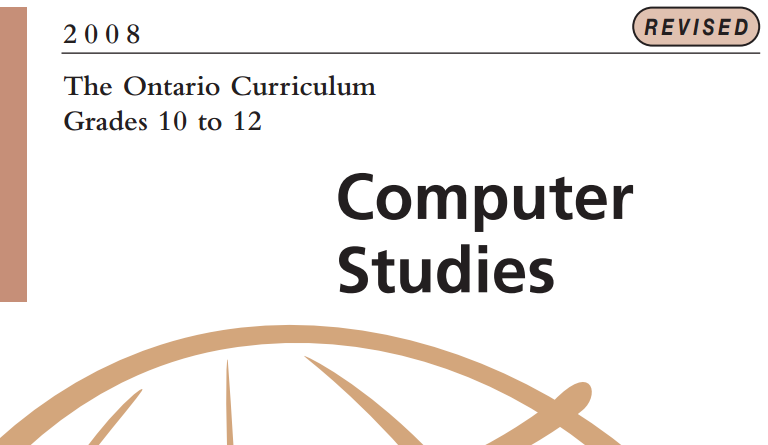Stay with me now, we’re going down the rabbit hole that is Ontario curriculum for computer studies, or as it’s also known, computer studies.
What was once computer science is now called computer studies. Shortly thereafter computer studies (same name) was created in the technology section of curriculum. These computer studies are so different that qualification in one doesn’t qualify you to teach the other (unless you happened to be already qualified in computer science ten years ago). The descriptions of each have so many similarities that you may be forgiven for wondering why a teacher of one isn’t a teacher of the other (computer studies).


Computer Studies (aka: computer science) defines itself as:
Computer studies is about how computers compute. It is not about learning how to use the computer, and it is much more than computer programming. Computer studies is the study of ways of representing objects and processes. It involves defining problems; analysing problems; designing solutions; and developing, testing, and maintaining programs. For the purposes of this document, the term computer studies refers to the study of computer science, meaning computer and algorithmic processes, including their principles, their hardware and software designs, their applications, and their impact on society. The major focus of these courses is the development of programming skills, which are important for success in future postsecondary studies.
When you compare the computer studies curriculum outline with the computer studies curriculum outline you may notice many similarities. Both begin with an emphasis on how they aren’t about teaching users to use computers, and neither are limited to programming. Both go on to emphasize a course of study focused on how computers operate, including how computers are able to create and manipulate objects and run processes. The computer studies (comp-sci) document then goes on to state that computer studies actually means computer science, which doesn’t really help clear anything up since computer studies (tech) calls it computer and information science, which may or may not be the same thing.
The computer studies (tech) curriculum is pretty much interchangeable with the computers studies (comp-sci) curriculum, but it also offers engineering focuses on electronics and computer hardware, so it might be argued that this is a more complete ‘computer studies’.


Computer and information science is more than running application programs and programming. Rather, it relates to the ways in which computers represent conceptual objects and how computer systems allow those objects to interact. Computer and information science is the study of ways of representing objects and processes. It involves defining problems, analysing and designing solutions, and developing, testing, and maintaining programs. Computer and information science education is relevant for all students because it incorporates a broad range of transferable problem-solving skills and techniques. It combines logical thinking, creative design, synthesis, and evaluation, and also teaches generically useful skills in such areas as communication, time management, organization, and teamwork. Computer and information science will prepare students for an increasingly technological world. A foundation in this discipline will introduce students to the excitement and opportunities afforded by this dynamic field and will begin to prepare them for careers in information technology.
As you can see, not only is the language used similar, but even the explanation of the scope of the subject seems the same. I suppose computer and information science are so completely different from computer science as to make this a no-brainer.
If this wasn’t muddy enough for you, there is also the issue of computer science teachers (because they were here first) getting grand-fathered in as computer studies-tech teachers, even though they may have no engineering background at all and may be as familiar with the inside of a computer as your grandmother. This results in computer science teachers (theoretical mathematics majors) attempting to teach how to solder a circuit or build a functioning network. More often than not, in my experience, they simply ignore this part of the subject.
If you want to be computer studies (tech) certified now-a-days you have to produce years of industry experience and professional certifications in order to even be considered qualified to begin the certification. If you were hanging out in a math class ten years ago it landed on you. I’m having trouble doing the pedagogical calculus with that one.
Between the confusion in subject area titles, almost identical descriptions and the right-time-in-the-right-place-with-no previous-experience history of computer studies qualifications, it’s little wonder that Ontario Education in this area is, at best, confusing, and not particularly effective. When you meet a computer studies teacher that doesn’t know how to open up a computer, you have to wonder where we went wrong.
I just threw together a quick venn diagram of computer studies to try and straighten out my thinking around this. Now, I’m not a curriculum expert at the ministry or anything, but it seems to me that arbitrarily dividing a subject into two camps isn’t very pedagogically helpful, let alone logical.
 |
I’m just spit-balling here, but wouldn’t a coherent course of computer studies
that recognizes how all these parts integrate into a whole make some kind of sense? |
If you consider the basics, computers run code on hardware. If you’re going to teach computer studies, I would suggest that it makes sense to recognize this and form your curriculum around this simple truth. Rather than grand-father in one extreme end of the computer studies curriculum (computer science), why not form a coherent, single department that studies the subject in all its glory?
If you’ve got previously computer science focused teachers, make it easy for them to expand their knowledge of the subject into the more practical side of computing, but don’t expect it to magically be there. If you have people coming at it from the more practical side (as I did from information technology), make it easier for them to bone up on coding and the theoretical side of things. You’d end up with a curriculum of computer studies that not only addresses the extreme ends of the spectrum (computer science up one end, electronics up the other), but also creates a sensible, interconnected and relevant understanding of computers in both staff and students. Best of all, you’d never run into a computer studies teacher who says things like, “Oh, I don’t touch computers, I have no idea how to fix one.”
Until we recognize computer studies as a single, coherent course of study and integrate curriculum to support this truth, we’re going to continue to limp along producing radically undertrained graduates who aren’t remotely ready for what faces them. I often meet teachers in other schools who are surprised to learn that we teach computer engineering – or that it exists at all. When I was in high school we ran two full teachers worth of computer studies (12 sections). The school I work at now is about the same size and runs 7. Are computers really about half as relevant now as they were in 1986? Students numbers would suggest this is the case. Instead of creating a modern, adaptive, complete curriculum, Ontario has created a divisive, broken one that students ignore.
I’d like to think we’ll stop the bizarre divisions currently going on in Ontario computer studies curriculum, but I get the sense that there is some history in this that won’t go away. We need a clean sheet on Ontario’s approach to computer studies (starting with just one computer studies that incorporates the entire field of study), or we won’t be doing this emergent and vital 21st Century subject justice.
***
Follow-up: Doug Peterson pointed out what each curriculum document is supposed to be replacing on G+, so I’ve been trying to trace the process. Here’s what I’ve got so far:
There are three curriculum documents that come up for computer studies.
- The year 2000 Technology Studies document that contains computer studies as a complete field of study, from engineering to computer science.
- The 2008 Computer Studies document (revised) that looks like it is separating computer science from computer studies but took the computer studies name with it (implying, I think a complete study of computers, not just computer science)
- and the 2009 Technology Studies document (revised) that contains “Computer Tecnhology” and has stripped any computer or information science material out.
The 2008 Computer Studies (science) revised document states:
This document replaces the Computer and Information Science component of The Ontario Curriculum, Grades 9 and 10: technological Education, 1999, and of The Ontario Curriculum, Grades 11 and 12: Technological Education, 2000. Beginning in September 2009, all computer studies courses for Grades 10 to 12 will be based on the expectations outlined in this document.
The 2009 Tech-studies document (revised) states:
This document replaces all but the Computer and Information Science component of The Ontario Curriculum, Grades 11 and 12: Technological Education, 2000. Beginning in September 2009, all technological education courses for Grades 11 and 12 will be based on the expectations outlined in this document.
From the original 2000 Tech-Studies document:
This document replaces the sections of the following
curriculum guidelines that relate to the senior grades:
– Broad-based Technological Education, Grades 10, 11, and 12, 1995
– Computer Studies, Intermediate and Senior Divisions, 1983
– Computer Studies, Ontario Academic Course, 1987
– Technological Studies, Intermediate and Senior Divisions, Part C: Ontario Academic Courses, 1987
I still can’t help but think that the ‘computer studies’ title is at best confusing and at worst misleading. I wonder at the politics that played around that course of study being created with such an expansive (and previously used) title but such a specific focus. It would be like renaming the “biology” department “science”, taking one part of a larger course of study and implying that it is the whole subject. Computer Studies (the study of computers?) is not just computer science, or just engineering, or just information technology. Trying to understand it in such a fractured way leads to confusion in the general public and students who then aren’t taking the course.
 |
Just to throw a wrench in things, if you’re curious and look up
Ontario’s technology curriculum you get the old curriculum
document first every time. If you’re not up on the secret
war between comp-sci and comp-tech in Ontario, you’ll
remain ignorant looking at the old document. |
If you were teaching computer studies prior to September 2009, that meant computer studies (from end to end). If you were teaching computer studies after September 2009. it means only computer science. I’m beginning to see why computer science is atrophying in modern high schools. At a time when computer studies should be offering population wide access to digital literacy, one of the foundational areas of computer studies in it has taken its toys and gone home.
Another question (that Doug probably knows the answer to) is those early computer studies courses, were they computer science based on more general in their approach to all aspects of computing. My own memory of taking computer courses in the 1980s was very comp-sci/math based, and the teachers who were qualified to teach computer studies were computer scientists in university. Yet in 2000 it looks like technology education took over computer studies (including computer science), yet the amalgamation doesn’t appear to have worked (hence the 2008/9 revisions). I wonder why not.
The division seems to have happened over the past fourteen years, starting in 2000 with a failed attempt to place computer studies in technology education. It’s no better today, and I get the sense that the attempted fixes have caused more problems than they solved.














